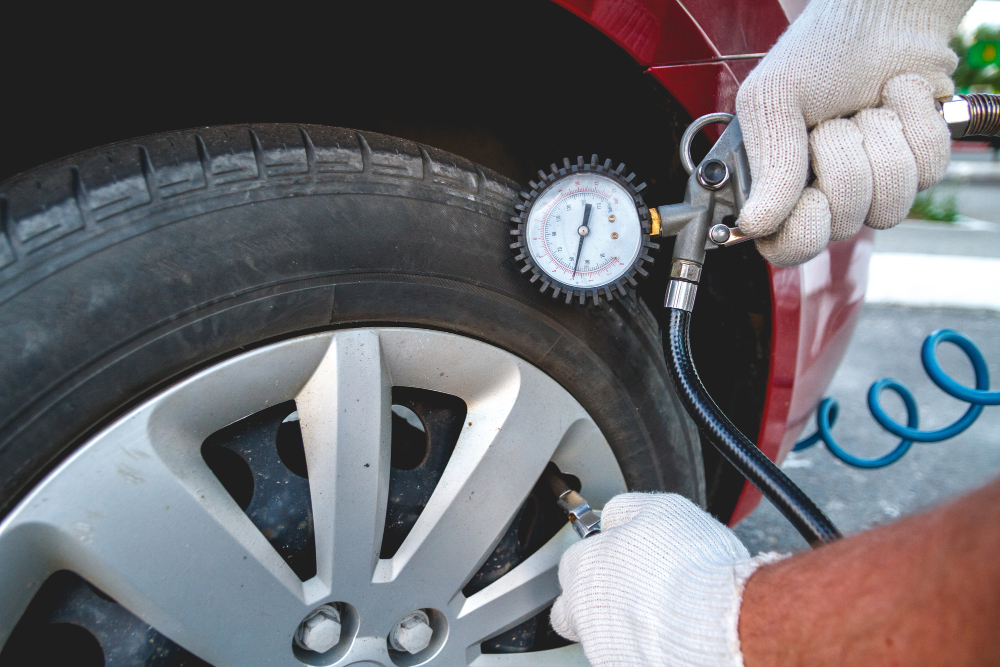Maintaining proper pressure in the tires is a fundamental aspect of vehicle safety and performance. However, the relentless battle against fluctuating tire pressure can be a source of frustration for many drivers.
Fortunately, there is a solution that offers more stable and consistent tire pressure: nitrogen-filled tires. In this article, we will delve into the science behind tires filled with nitrogen and explore why they are excelling at performance and safety. Say goodbye to under inflated tires and welcome the world of stable tire pressures with nitrogen!
Table of Contents
ToggleKicking off the Journey: The Basics of Nitrogen in Tires
Nearly every tire has nitrogen in it, even those filled with regular air.
When a tire is filled with compressed air, it is being filled with a mix of gases composed of 78% nitrogen, 21% oxygen, and a mix of water vapor, CO2, and noble gas. In contrast, nitrogen tire inflation uses pure nitrogen.
So, even when choosing regular tires, you’re still driving on nitrogen. However, tires filled with pure nitrogen have several distinctions from standard air-filled tires!
Standard Air vs. Nitrogen: Which is Better?
While air is easily available and cheaper in the short term than nitrogen, it isn’t necessarily the best option for keeping the correct air pressure at its optimum level. That is why nitrogen holds an advantage over standard air — it keeps your tires inflated for longer!
The Intriguing Science Behind Nitrogen
The science behind nitrogen’s benefits lies at the molecular level.
Unlike regular air, nitrogen seeps out of tires at a slower rate due to its molecular properties. Nitrogen molecules are larger compared to oxygen, making it more difficult for them to permeate through the tire walls.
This reduced permeation rate means that nitrogen-filled tires can maintain their pressure for a longer period compared to tires filled with regular air, losing pressure 40% slower than oxygen. Although nitrogen seepage is slower compared to regular air, tires will still lose pressure over time.
The Vital Role of Maintaining Proper Tire Pressure
Maintaining proper tire pressure is crucial for driving safety, as it ensures optimal traction, stability, and control on the road, reducing the risk of accidents. Under-inflated tires compromise handling and can lead to decreased grip, especially in adverse weather conditions.
On the other hand, overinflated tires reduce the tire’s contact patch, negatively impacting braking distance and cornering abilities.
Furthermore, inflation pressure directly influences vehicle handling and performance. Well-inflated tires provide better responsiveness, stability, and maneuverability, enhancing overall driving experience. They enable precise steering control, improved cornering capabilities, and better performance during emergency situations.
Due to its impact on your car’s performance, it is critical to regularly check and maintain proper tire inflation pressure.
How Does Proper Tire Pressure Benefit Car Performance?
Proper inflation pressure benefits your vehicle’s performance by boosting its longevity and fuel economy.
In terms of longevity, proper pressure reduces tire wear, keeping the tires in ideal condition for longer. Incorrect pressure distribution can result in uneven wear patterns, reducing the tire’s lifespan and necessitating more frequent replacements.
Since nitrogen makes it easier to keep tires properly inflated, nitrogen tires have been shown to last 31% longer than conventional ones, improving their longevity!
The ideal tire pressure also contributes to a better fuel economy, leading to savings at the gas pump. A study on nitrogen filled tires revealed that they annually save about 6% or $119 in fuel costs.
How Nitrogen Retains Inflation Pressure
Nitrogen’s molecular structure is what makes it suited to retaining adequate tire pressure. In addition to seeping out of your tire slower, nitrogen is less susceptible to pressure changes based on the temperature outside.
While all gases expand with heat and contract with cold, nitrogen does this less than conventional air. As a result, nitrogen tires have more consistent pressure than regular tires even on cold days.
Nitrogen is Key to Preventing Tire Blowouts
Nitrogen also reduces the chance of a tire blowout by up to 80%!
However, it’s worth noting that blowouts can occur due to various factors, not just tire pressure. Some common causes include:
- Tire damage
- Excessive wear and tear
- Vehicle overloading
- Poor road conditions
- High-speed driving
While using nitrogen mitigates issues related to pressure loss, it does not eliminate the possibility of a blowout.
Is Nitrogen the Right Choice for Every Tire Type?
Whether it’s a commercial truck, airplane, race car, or passenger vehicle, nitrogen inflation can improve any tire. Tires with nitrogen aren’t just for Formula 1, they are also for the everyday car and family van!
Take Action: Discover the Benefits of Nitrogen for Your Tires Today!
At Fuel and Tire Saver, we offer a nitrogen tire inflation service as a cost-effective solution for optimizing tire performance!
Our team is committed to the science behind nitrogen tire inflation and can work with you to develop a customized tire maintenance plan that meets the unique needs of your fleet.
Contact Fuel and Tire Saver and check out our resources page to learn more about our nitrogen-filled tires and how we can help keep your fleet rolling smoothly!
References
- How Nitrogen-Inflated Tires Can Improve Fuel Efficiency | Fuel and Tire Saver — Accessed 22 May 2023.
- Is Nitrogen Inflation Really More Expensive Than Air Inflation? | Fuel and Tire Saver — Accessed 22 May 2023.
- Should You Really Put Nitrogen in Your Car Tires? | Popular Mechanics — Accessed 22 May 2023.
- The Importance of Proper Nitrogen Pressure for Optimal Tire Performance | Fuel and Tire Saver — Accessed 22 May 2023.


